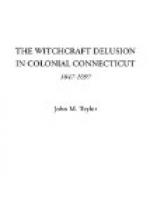In May, 1630, Ludlow came to Massachusetts, as one of the Assistants under the charter of “The Governor and company of Massachusetts Bay in New England.”
His services in the Bay Colony from 1630-35 ranged from the duties of a magistrate in the Great Charter Court to those of the high office of Deputy Governor. The quality of that service is written in a bare statement of his various offices—surveyor, negotiator of the Pequot treaty, colonel ex officio, auditor of Governor Winthrop’s accounts, superintendent of fortifications, military commissioner, member of the General Court, Deputy Governor when Thomas Dudley was Governor; and he was always one of the foremost men in civil, political, and social affairs, to the day of his departure to “the valley of the long river,”—a day of good fortune for Connecticut.
When Massachusetts established church membership as the condition of suffrage,—and radical differences of opinion on other matters arose,—it marked the culmination of a set purpose of some of her ablest men to remove from her jurisdiction, among whom Hooker, Ludlow, and Haynes were the most notable. The General Court created a commission to govern Connecticut for a year, and made Ludlow its chief. He came to the new land of promise with the Dorchester men, and settled in Windsor in 1635-36.
What he did in the nineteen years of his residence at Windsor and Fairfield is epitomized in a brief summary of the duties and honors to which he was called by his fellowmen:
Chief of the Massachusetts commission and the first Governor, de facto; organizer and chief magistrate of the first court; writer of the earliest laws; president of the court which declared war against the Pequots; framer of the Fundamental Orders—the Constitution of 1639—which embodied the great principles of government by the people propounded and elucidated by the illustrious Thomas Hooker, in his letter to Governor Winthrop, and in his famous sermon; compiler, at the request of the General Court, of the Body of Lawes, the Code of 1650; commissioner on important state matters; commissioner for the United Colonies; founder and defender of Fairfield; patriot, jurist, statesman.
Ludlow left Connecticut in 1654, not to die in obscurity as the earlier writers imagined, but to serve abroad for several years in positions of honor and distinction.
Cromwell invited him to return, as he did many of the leading Puritans in New England, and appointed him a commissioner for the administration of justice in Dublin; also to serve with the chief justice of the upper bench and other distinguished lawyers, to determine all the claims to the forfeited Irish lands, and at last as a Master in Chancery.
Ten years Ludlow served in these important stations; and at his death, probably in 1664, he was buried in St. Michael’s churchyard in Dublin, with his wife—a sister of Governor John Endicott—and other members of his family.[K]




